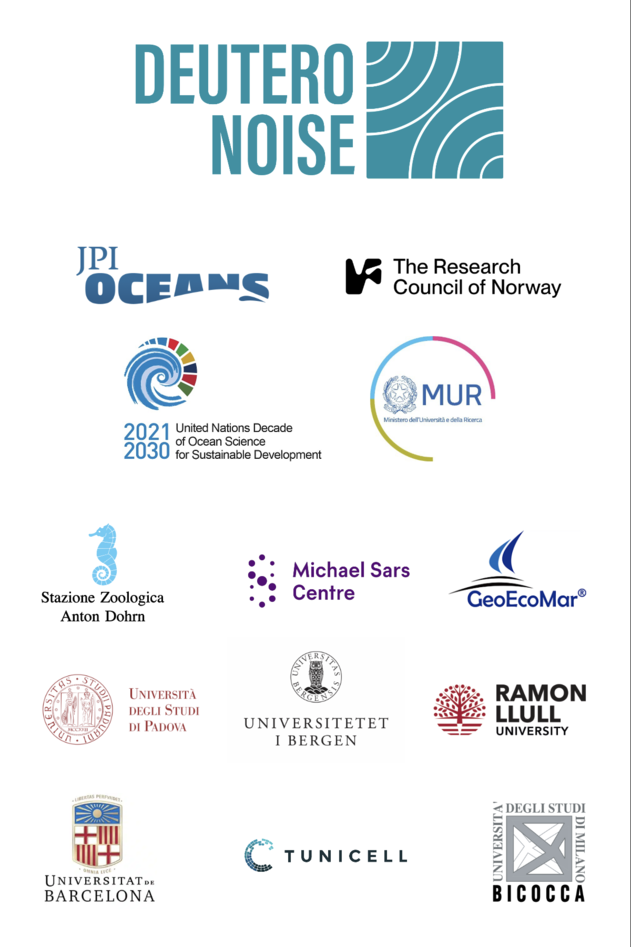DeuteroNoise: How marine organisms hold the secret to a quieter ocean
A year ago, scientists from across Europe came together concerned about how noise pollution was impacting not only marine life but the health of our oceans. Together they built a consortium that aims to understand how noise produced by humans, or anthropogenic noise, affects marine life.
DeuteroNoise - How marine organisms hold the secret for a quieter ocean.
Hovedinnhold
The DeuteroNoise project is an interdisciplinary and collaborative endeavor focused on characterizing noise pollution caused by maritime traffic to test the impact of anthropogenic noise on various species of marine invertebrates. In vertebrates, noise interferes with their ability to communicate, to listen to sounds from various sources and often affects their orientation ability. Anthropogenic noise exerts its effects by affecting the mechanoreceptor cells of the ear and can cause hearing problems, or even deafness. Homologous cells have been discovered in tunicate marine invertebrates closely related to vertebrates, raising the question of whether marine invertebrates can sense noise and, therefore whether they can be affected by noise.

The international consortium, led by Professor Lucia Manni, includes participants from Spain, Romania, Italy, and Norway. The scientific coordinator of the JPI Oceans DeuteroNoise consortium and Principal Investigator of the project Marios Chatzigeorgiou will be the responsible scientist for the experiments in Norway. Daniel Chourrout's group will be performing the noise experiments in Oikopleura dioica, and the SME Ocean TuniCell will be involved in hosting some of the on-field noise measurements. The DeuteroNoise consortium has a budget of 1.4M Euros of which 1M Euros was secured from national funding agencies. As part of the grant, the Michael Sars team will receive more than 500K Euros of which 304K Euros are contributed by the Research Council of Norway.
“The JPI Oceans DeuteroNoise project is a great opportunity for my lab to start a new research line on the effects of anthropogenic noise on marine organisms, while establishing a great network of collaborators in the fields of acoustics and marine biology. I have always been interested in using basic biological research to deal with societal challenges, such as the impact of human activities on the marine environment’ Marios Chatzigeorgiou
An interdisciplinary team working together.
During the next three years, the consortium will work together to measure maritime noise at selected sites in the North Adriatic Sea, the Venetian Lagoon, the North Sea, the Black Sea, and the coast of Barcelona in the Mediterranean Sea. Noise pollution will afterward be modeled and simulated in laboratories performing noise measurements, modeling of noise, and in-lab experiments to test the effects of noise pollution on animal behavior and physiology, with a special focus on potential effects in the nervous system and sensory organs, the immune system, and embryonic development. Behavioral, morphological, and genetic studies will be conducted on invertebrate animals living in areas affected by anthropogenic noise pollution and our findings will be compared to those obtained from animals in noise-free areas.
The interdisciplinary team includes physicists who will work on noise analysis and the physics of noise in order to perform underwater recordings, artificial intelligence scientists who will be responsible for decoding and unmixing the different types of recorded underwater noise, and biologists who will investigate the effects of noise in the lab. Models will be generated that will predict sites that are in danger of experiencing noise pollution, supporting future efforts in predicting ecosystem responses to anthropogenic noise and in developing policies to regulate it and infer best practices to achieve GES (Good Environment Status) of European sea basins.
Impacting European policy.
The project's research will determine how species react to noise, identify morphological features and common genetic pathways that respond as adaptations to noise, and predict sensitivities in closely related animals that cannot be easily studied in the laboratory or in situ by comparing the effects of noise across different organisms located in the four basins. And secondly, it will give policymakers in the European Union the necessary data to establish noise thresholds and allow them to make informed decisions on setting thresholds for their maritime industry.
By raising awareness by informing authorities, companies, children and teenagers, and society in general, DeuteroNoise aims to improve the required policies which include setting new limits for the sound levels produced by marine traffic and potentially redirecting marine traffic away from areas that are rich in marine organisms with high sensitivity to anthropogenic noise and thereby further protecting marine life in our oceans.
